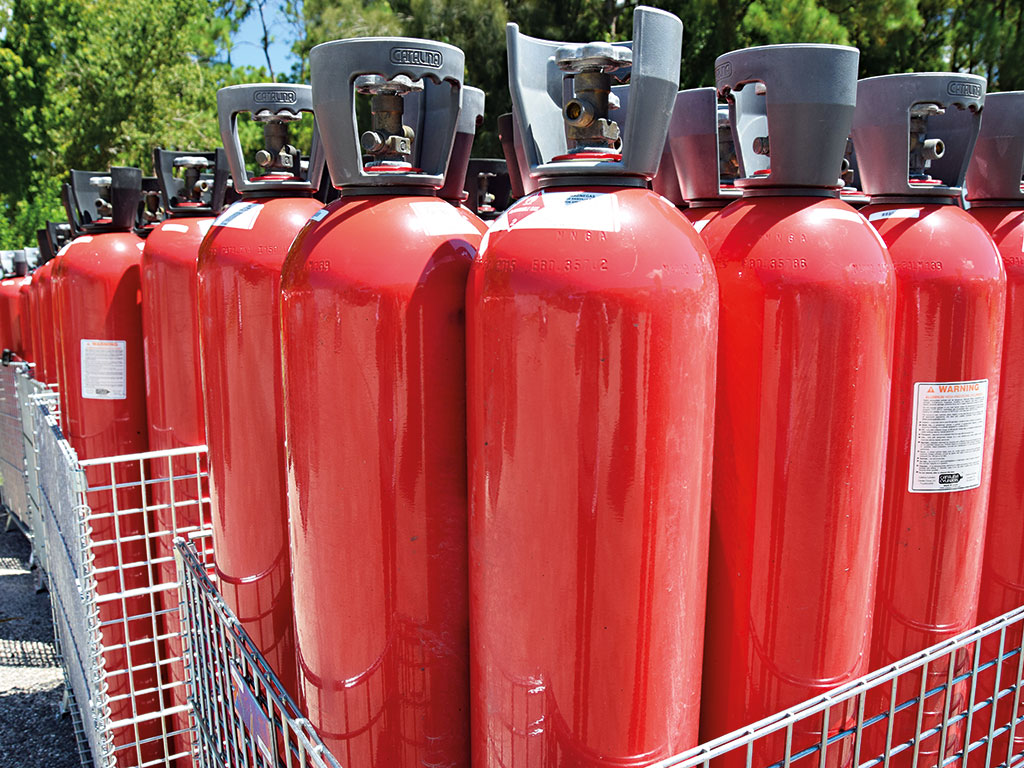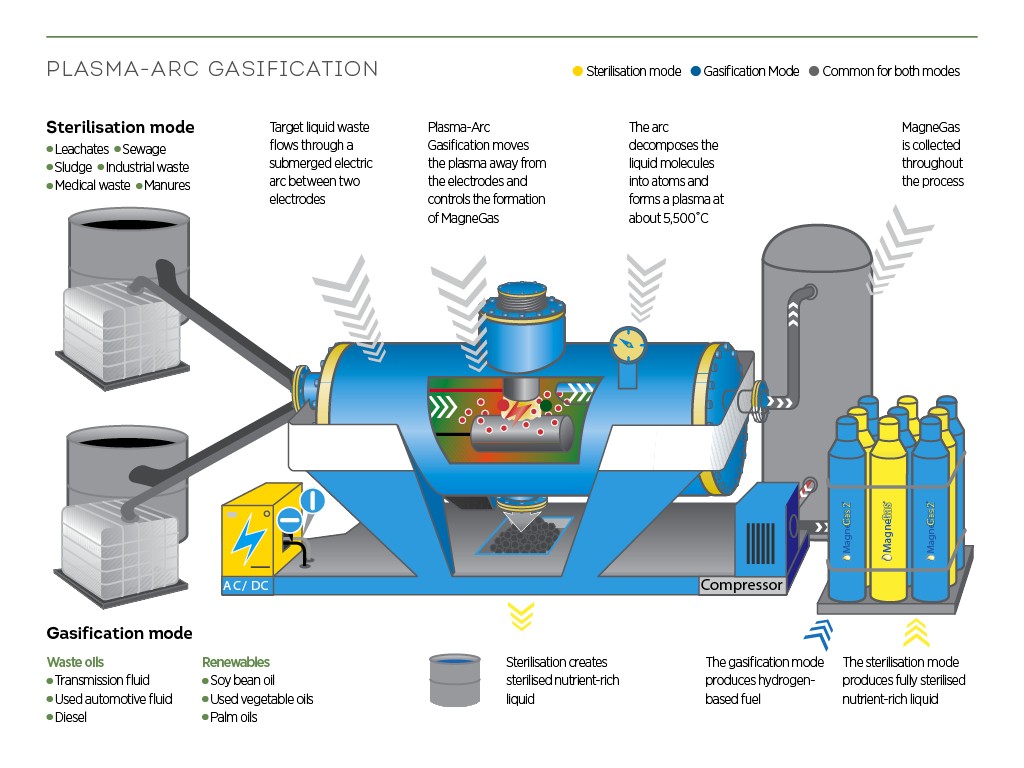Plasma-Arc Gasification helps reduce carbon footprints
MagneGas Corporation’s Plasma-Arc Gasification method offers a sustainable, cleaner source of energy for developing countries

Cannisters of MagneGas collected through the Plasma-Arc Gasification method, which converts liquid waste into hydrogen-rich fuels
MagneGas Corporation is an alternative energy company that invented the patented Plasma-Arc Gasification method to convert liquid waste into hydrogen-rich fuels. Plasma-Arc Gasification was originally invented as a way to safely sterilise manure and turn it into a usable fertiliser while retaining nutrients, but it was later discovered that the syngas by-product can be used as a safer, cleaner, more efficient and versatile fuel than certain other gaseous products currently available on the market.
The continued development of this powerful technology may provide answers to some of the biggest economic problems around the world, including waste management, CO2 emissions, resource preservation, and more. Driven by this potential, MagneGas took it upon itself to travel the globe and implement its technology in both developed and developing regions, to spread the impact of the innovative Plasma-Arc Gasification. For its efforts and success, MagneGas Corporation was named the overall winner of the 2015 New Economy Award for Best Alternative Fuel Solutions.
By relying on renewable resources, communities are able to preserve their current natural resources instead of extracting them
MagneGas Corporation is currently working, and has partners, in Italy, India, China, Australia and the US. It also has many ongoing projects and developing prospects in Central America, the Caribbean and Africa. These specific regions have been targeted by MagneGas Corporation in an effort to address the lack of sustainable domestic energy sources, inefficient waste management, poor resource management, and their overall need for economic development and sustainable infrastructure.
Smaller carbon footprint
MagneGas may provide the sustainable and more efficient source of energy that is required for industrial manufacturing and economic development within a country. Many developing nations are completely dependent on imports, leaving them exposed to the volatility of the markets. Because of this, many choose to import the most accessible fuels, such as propane, natural gas and acetylene gas, which all have a significant carbon footprint. In fact, developing countries have the fastest growing rate of carbon emissions per capita, with no sign of slowing.
Not only does the Plasma-Arc Gasification process release a very small amount of greenhouse gases, but the syngas by-product (MagneGas) also emits CO2 at a lower rate than competing gases. With the United Nation’s newly set Sustainable Development Goals of reducing the global carbon footprint, MagneGas has the potential to lead the way for all countries to join in bettering our global environment.
There are already a handful of alternative fuel solutions on the market, but when it comes to off-the-grid developing countries, there is an inability to build the expensive refineries and source the raw inputs needed for producing these other fuels. MagneGas has the benefit of being able to run production off-grid with a diesel generator or even solar array. This makes the production of a greener gas achievable in regions that have energy limitations or structural deficiencies.
The inputs required to run Plasma-Arc Gasification include, but are not limited to: petroleum, liquid-based oil waste, automotive liquid waste, sewage, sludge, industrial and medical waste, and manures. Using these materials not only addresses the accessibility and affordability of fuel production inputs, but also provides a much-needed waste management solution for improving the health and safety of the community.
By relying on renewable resources, communities are able to preserve their current natural resources instead of extracting them. In many cases, developing countries hold valuable or limited resources such as oil or wood, but they do not have the industry developed to properly extract or preserve them. This leads to the nation contracting out or improperly extracting these resources. In such cases, the nation loses valuable control over the resource, profits, possible infrastructure, and workforce.
MagneGas Corporation seeks to work with in-country private organisations, or private/public combinations, to set up all operations locally. By giving a community a way to produce its own fuel, the company can help work towards eliminating the need to extract oil and wood. In addition, all resources, profits, infrastructure, and members of the workforce are kept under the control of the community itself and provide a platform to achieve true economic development and sustainability. That, for MagneGas Corporation, is the end goal.

Unhelpful aid
It is evident many developing countries are relying too much on humanitarian aid that only provides short-term solutions. Out-of-country support is beneficial for short-term crises and disasters – a band-aid if you will – but it is not enough for full economic development and sustained infrastructure development.
Over the last 42 years, Africa has received $568bn in aid. In the same time, the continent has shown near-zero growth per capita across the board. While South Korea has been cited as an aid success story, a closer look shows the Koreans were unique in playing a lead role in delegating their aid resources, which allowed more control over their own economic recovery. Furthermore, the timeline in South Korea reveals most progress occurred after aid was reduced. The fact is, it is difficult to find cases of large inflows of aid and technical assistance leading to sustainable development anywhere in the world.
Throwing donated money at a problem does not make a substantial long-term difference in developing regions
Billions of dollars are donated every year to address issues in developing nations, but the unemployment rate, housing displacement, and disease continue to rise in the majority of aid-recipient countries. The current practice of throwing donated money at a problem does not make a substantial long-term difference in developing regions; giving influential assistance to countries in need will require a new approach.
MagneGas Corporation believes resilient innovations, such as its Plasma-Arc Gasification process, and its company values of contributing to a sustainable world are what are needed for progress to occur. In doing this, the ability to invest and encourage entrepreneurship expands, leading to a more progressive society that contributes to health and sustainability on a global level and reduces dependence on humanitarian aid.
MagneGas Corporation is not a charity supported by donations to relieve short-term catastrophes or inefficient developing markets: it is a socially responsible business supported by impact investors who are dedicated to generating a measurable social, environmental and economic impact alongside a financial return. With the power of the company’s Plasma-Arc Gasification and by working directly with communities, MagneGas is breaking ground in sustainable development across the globe.













